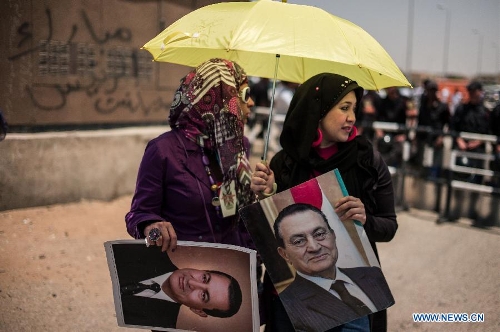Egyptian court orders Hosni Mubarak freed

Supporters of former Egyptian president Hosni Mubarak hold posters outside the Egyptian police academy in Cairo, Egypt, May 11, 2013. Egypt's court decided Saturday to adjourn the retrial of former president Hosni Mubarak to June 8, state TV reported. The retrial includes Mubarak, his two sons Alaa and Gamal, former interior minister Habib al-Adli, six former top police officials and fugitive business tycoon Hussein Salem over charges of responsibility for killing protesters as well as corruption and profiteering. (Xinhua/Li Muzi)
Deposed Egyptian leader Hosni Mubarak will leave jail as early as Thursday after a court ruling jolted a divided nation already in turmoil seven weeks after the army toppled Islamist president Mohamed Morsi.
Convening on Wednesday at the Cairo jail where Mubarak is held, the court upheld a petition from his lawyer demanding the release of the man who ruled Egypt for 30 years until he was overthrown during the uprisings that swept the Arab world in early 2011.
Judicial and security sources said the court had ordered Mubarak's release. His lawyer, Fareed al-Deeb, confirmed this as he left Tora prison after the session.
There was no news of an immediate order for Mubarak's release, and he still faces trials in the four cases, which include allegations of corruption and killing protesters.
Mubarak, 85, was sentenced to life in prison last year for failing to prevent the killing of demonstrators. But a court accepted his appeal earlier this year and ordered a retrial.
The court ruling removed the last legal basis for his imprisonment in connection with a corruption case, following a similar decision in another corruption case on Monday.
Mubarak's release might lead to more turbulence in Egypt, where the army ousted Morsi, the country's first freely elected leader, on July 3, saying it was responding to the will of the people following vast protests demanding his removal.
The generals have installed an interim administration to oversee a roadmap they say will lead Egypt back to democracy.
The ailing former president probably has no political future. But many Egyptians will see his release as the rehabilitation of an old order that endured six decades of military-backed rule and even a reversal of the pro-democracy revolt that toppled him.
The release of Mubarak brings more uncertainty to the situation in Egypt, Tian Wenlin, a research fellow on Middle Eastern studies at the China Institutes of Contemporary International Relations, told the Global Times.
"The Egyptian interim government is seen by some as pro-Mubarak as some of its members served under him, but the ouster of Mubarak is a major result of the country's revolution in 2011, so people who oppose him will become new factors of instability in the country," he said.
Pan Guang, a vice president of the Chinese Association for Middle East Studies, told the Global Times that the influence of Mubarak in Egypt is very limited now and he is unlikely to change the balance of power between the military and Islamists.
For the liberals, what they fear most now is the rule of Islamists and not the return of Mubarak, Pan said.
"However, it might give the Muslim Brotherhood more 'justified' reasons to confront the military," he added.
At least 900 people, including 100 soldiers and police, have been killed in a crackdown on Morsi's Muslim Brotherhood in the past week, making it Egypt's bloodiest civil episode in decades.
In response to the bloodshed, the EU on Wednesday made a decision to restrict the export of weapons to Egypt, announced the bloc's foreign policy chief Catherine Ashton following an extraordinary Foreign Affair Council in Brussels.
Ministers of the 28-nation bloc holding emergency talks in response to the violence in Egypt also agreed to review aid to the country, she added.